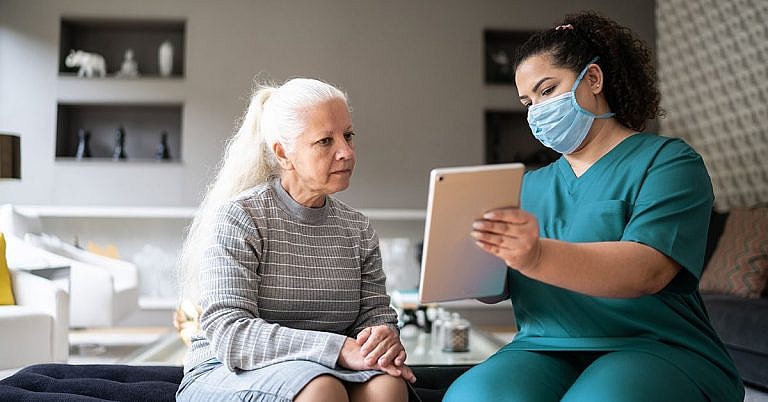What is Stomach Cancer?
[trp_language language=”en_US”]
Stomach cancer, sometimes called gastric cancer, is a slowly progressing cancer that arises from the stomach. Symptoms of stomach cancer are abdominal fullness, dark stools, nausea, vomiting, and unexplained weight loss, although many people will have no symptoms in the early stages. Men over the age 40, people who have an infection of the stomach by the Helicobacter pylori bacteria, or who have inflammation of the stomach over a long period of time tend to have a higher risk of getting stomach cancer. Stomach cancer is most commonly treated with a combination of surgery, chemotherapy and, sometimes, radiotherapy. Stomach cancer is often diagnosed when it is already in an advanced stage, and this can be difficult to treat. People who are diagnosed early have a better chance of recovery.
Risks
Stomach cancer is an uncommon condition. Cancer occurs when a group of abnormal cells grows uncontrollably. These cells can destroy the normal, healthy cells around them, and can spread into other areas of the body. An important risk factor for the development of stomach cancer is infection with Helicobacter pylori (a bacteria). This bacteria can cause stomach ulcers which, over time, can develop into cancer. Smoking and excessive alcohol intake increase the risk for gastric cancer significantly. Some foods may increase the risk of this condition, and these include smoked foods, salt-rich foods, red meat and pickled vegetables when eaten in large amounts. Some causes of stomach cancers seem to run in families, so having a family member who has had stomach cancer may increase the risk of developing this condition.
Symptoms
People with stomach cancer often have no symptoms in the early stages of the condition. Some people experience abdominal pain, heartburn, a loss of appetite or a feeling of becoming quickly full when eating. As the condition progresses, people may feel weak and tired, and may develop abdominal pain, nausea, vomiting, black stools and unexplained weight loss.
Diagnosis
Diagnosis is usually made based on the symptoms, and by carrying out a physical examination and endoscopy, a process that involves inserting a camera through the mouth to look at the stomach. A sample of the stomach ulcer or growth (a biopsy) is taken to investigate for cancer. A CT scan (computed tomography scan) may be done to look at the size of the cancer and for any evidence of spread beyond the stomach.
Treatment
Treatment of stomach cancer depends on the size of the cancer, the exact type of cancer and whether cancer has spread beyond the stomach. This combination of these factors decides the stage of the cancer. Depending on the stage, stomach cancer can be treated by surgical removal of part of or the whole stomach, by radiotherapy or chemotherapy, or a combination of these therapies. The treating doctor can give the best advice as to treatment.
Prevention
Stomach ulcers should be treated and followed up with an endoscopy. Giving up smoking and reducing alcohol intake may also help to reduce the risk of stomach cancer. Eating a diet low in meat, and with plenty of vegetables, unsaturated fats and whole grains (a Mediterranean diet) may reduce the risk of stomach cancer.
Other names for stomach cancer
- Gastric cancer
- Stomach carcinoma
[/trp_language]
[trp_language language=”ar”][wp_show_posts id=””][/trp_language]
[trp_language language=”fr_FR”][wp_show_posts id=””][/trp_language]
**What is Stomach Cancer?**
**Q: What is stomach cancer?**
A: Stomach cancer, also known as gastric cancer, arises when malignant cells form in the lining of the stomach. It is one of the most common cancers worldwide, particularly in less developed regions.
**Q: What are the known risk factors for stomach cancer?**
A: Unfortunately, the exact causes of stomach cancer are not fully understood, but several risk factors have been identified, including:
* **Helicobacter pylori (H. pylori) infection:** This is a type of bacteria that commonly lives in the stomach.
* **Smoking:** Cigarette smoking increases the risk of stomach cancer.
* **Diets low in fruits and vegetables:** Consuming a diet lacking in fruits and vegetables has been associated with an increased risk of stomach cancer.
* **Obesity:** Being overweight or obese is linked to an increased risk of stomach cancer.
* **Certain medical conditions:** Conditions such as pernicious anemia and familial adenomatous polyposis (FAP) can increase the risk of developing stomach cancer.
* **Family history:** Individuals with a family history of stomach cancer may be at a higher risk.
* **Alcohol consumption:** Excessive alcohol consumption has been linked to an increased risk of stomach cancer.
* **Salt-preserved foods:** Diets high in salt-preserved foods, such as pickled vegetables, have been associated with an increased risk of stomach cancer.
**Q: What are the signs and symptoms of stomach cancer?**
A: Stomach cancer often does not have noticeable symptoms in the early stages. As the cancer progresses, symptoms may include:
* **Persistent indigestion or heartburn:** Indigestion and heartburn are common symptoms of stomach cancer but can also be associated with other conditions.
* **Abdominal pain:** This pain may be located in the upper middle or left abdomen and may worsen after eating.
* **Loss of appetite:** Loss of appetite or feeling full quickly is often an early symptom of stomach cancer.
* **Nausea and vomiting:** These symptoms can occur intermittently or persistently.
* **Stomach bloating:** Feeling bloated or having a sensation of fullness is another common symptom.
* **Weight loss:** Unexplained weight loss can be a sign of stomach cancer.
* **Blood in vomit or stool:** This is a symptom that should prompt immediate medical evaluation.
* **Difficulty swallowing:** Advanced stomach cancer may cause difficulty swallowing solid foods.
**Q: How is stomach cancer diagnosed?**
A: Diagnosis of stomach cancer may involve:
* **Upper gastrointestinal (GI) endoscopy:** A thin, flexible tube with a camera is used to examine the lining of the stomach.
* **Biopsy:** During endoscopy, a tissue sample can be obtained from the suspected cancerous area for pathological examination.
* **Imaging tests:** Computed tomography (CT) scans and magnetic resonance imaging (MRI) scans can be used to assess the extent of cancer and detect any spread to other organs.
**Q: How is stomach cancer treated?**
A: Treatment options for stomach cancer depend on various factors, including the stage of cancer, overall health, and patient preferences. Common treatment modalities include:
* **Surgery:** The primary treatment for stomach cancer is surgery to remove the cancerous portion of the stomach and nearby lymph nodes.
* **Chemotherapy:** Chemotherapy uses drugs to kill cancer cells and may be used before or after surgery.
* **Radiation therapy:** This treatment uses high-energy radiation beams to shrink tumors and kill cancer cells.
* **Targeted therapy:** These medications target specific molecules involved in cancer growth.
* **Immunotherapy:** This treatment boosts the body’s immune system to fight against cancer cells.
**Conclusion:**
Stomach cancer is a serious disease with potential life-threatening consequences. Early detection and diagnosis are crucial for increasing the chances of successful treatment. If you experience any of the symptoms mentioned above, it is essential to consult a healthcare professional promptly to rule out or diagnose any underlying medical conditions, including stomach cancer. Maintaining a healthy lifestyle, avoiding known risk factors, and undergoing regular screening tests, such as endoscopy for individuals at high risk, can help reduce the chances of developing stomach cancer. Remember, prevention and early detection are key to improving outcomes for stomach cancer.








# StomachCancer
# Health